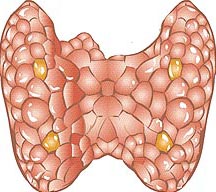An Over-Active Thyroid – The Facts
What is it?
An over-active thyroid gland is known medically as thyrotoxicosis or Graves' disease.
Although thyroid problems can affect anyone of any age, women are eight times more susceptible — particularly between their 30s and 60s.
It is thought that, in most cases, the thyroid gland becomes over-active due to overstimulation by the pituitary gland at the base of the brain. The high activity causes toxic reactions in the body. The symptoms include nervous over-activity, anxiety and tension, perspiring,  high temperature, loss of weight despite eating lots of food, slightly shaking hands, bulging eyes, diarrhoea, rapid heartbeat and pulse rate with palpitations, and often an enlargement of the thyroid gland. high temperature, loss of weight despite eating lots of food, slightly shaking hands, bulging eyes, diarrhoea, rapid heartbeat and pulse rate with palpitations, and often an enlargement of the thyroid gland.
What Causes It?
The precise cause is uncertain. However, the symptoms are due to an increase of the normal thyroid gland secretions.
How to Treat It
Once the condition is diagnosed, treatment is usually effective, almost always starting with tablets. Special anti-thyroid drugs may be used to block the action of the thyroid hormone. Drugs to slow down the heartbeat are also often needed for a limited period. Sometimes over-activity doesn't last long and may not recur. In other patients, the over-active thyroid seems to be less controllable. For them and for young patients, an operation to remove part of the gland will be advised.
Note: Always insist on a test for tolerance to iodine before submitting to iodine treatment.
|